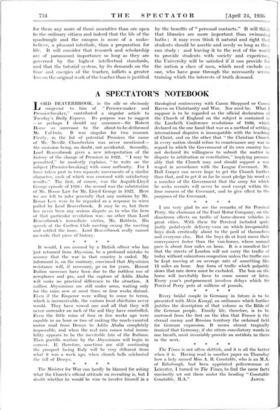A SPECTATOR'S NOTEBOOK
LORD BEAVERBROOK, in the role so obviously congenial to him of "Premier-maker and Premier-breaker," contributed a singular article to Tuesday's Daily Express. Its purpose was to suggest —or perhaps I. should say announce—Sir Robert Horne as successor to the about-to-be-dethroned Mr. r ali win. It was singular for two reasons. Firstly, in the list of potential Premiers the name of Mr. Neville Chamberlain was never mentioned— the omission being, no doubt, not accidental. Secondly, Lord Beaverbrook gives a new interpretation of the history of the change of Premiers in 1922. "1 may be permitted," he modestly explains, "to write on the subject [Premier-breaking] with some authority. For I have taken part in two separate movements of a similar character, each of which was crowned with satisfactory results." The first, of course, was the Asquith-Lloyd George episode of 1916: the second was the substitution of Mr. Bonar Law for Mr. Lloyd George in 1922. Here we are left to infer generally that any motions. by Mr. Dollar Law were to be regarded as a response to wires pulled by Lord Beaverbrook. It may be so, but there has never been any serious dispute as to who the hero of that particular revolution was—no other than Lord Beaverbrook's immediate victim, Mr. Baldwin. His speech at the Carlton Club meeting swung the meeting and settled the issue. Lord Beaverbrook really cannot un-write that piece of history.
It would, I am assured by a British officer who has just returned from Abyssinia, be a profound mistake to assume that the war in that country is ended. My informant is, on the contrary, convinced that Abyssinian resistance will, if necessary, go on for years. Recent Italian successes have been due to the ruthless use of aeroplanes and gas, and the capture of Addis Ababa will make no practical difference to the situation. A million Abyssinians are still under arms, waiting only for the rains now at most three or four weeks distant. Even if the Emperor were willing to come to terms, which is inconceivable, the various local chieftains never would. They have vowed one and all that they will never surrender an inch of the soil they have controlled. Even the little rains of four or five weeks ago were capable in an hour or two of making the much-vaunted motor road from Dessye to Addis Ababa completely impassable, and when the real rain comes total -immo- bility appears to be the inevitable fate of the Italians. Then guerilla warfare by the Abyssinians will begin in earnest. If, therefore, sanctions are still continuing the prospect facing Italy will be very different from what it was a week ago, when church bells celebrated the fall of Dessye.
The Minister for War can hardly be blamed for asking what the Church's official attitude on recruiting is, but I doubt whether he would be wise to involve himself in a theological controversy with Canon Sheppard or Canon Raven on Christianity and War. Nor need he. What I suppose is to be regarded as the official declaration of the Church of England on the subject is contained in the Lambeth Conference resolutions of 1930, which declared on the one hand that war as a method of settling international disputes is incompatible with the teaching of Christ, and on the other that "the Christian Church in every nation should refuse to countenance any war in regard to which the Government of its own country has not declared its willingness to submit the matter in dispute to arbitration or conciliation," implying presum- ably that the Church may and should support a war waged in accordance with the League Covenant. Mr. Duff Cooper can never hope to get the Church further than that, and to get it so far he must pledge his word as a member of the Government. that the army for which he seeks recruits will never be used except within the four corners of the Covenant, and to give effect to the purposes of the Covenant.
I am very glad to see the remarks of Sir Percival Perry, the chairman of the Ford Motor Company, on the disastrous effects on traffic of horse-drawn vehicles in great cities. With these Sir Percival included quite justly pedal-cycle delivery-vans on which irresponsible boys dash erratically about to the peril of themselves and everyone else. But the boys do at least move their conveyances faster than the van-horses, whose normal pace is about four miles an hour. It is a manifest fact that the streets of London will not carry the traffic of today without calamitous congestion unless the traffic can be kept moving at an average rate of something like 15 miles an hour. Any form of traffic which palpably slows that rate down must be excluded. The ban on the horse will inevitably have to come sooner or later. Every year's postponement involves delays which Sir Percival Perry puts at millions of pounds.
Every bridal couple in Germany in future is to be presented with Mein Kampf, an ordinance which further justifies the description of that volume as the Bible of the German people. Family life, therefore, is to be nurtured from the first on the idea that France is the eternal enemy and Russian territory the ordained field for German expansion. It seems almost tragically ironical that Germany, if she utters conciliatory words in one breath, must invariably provide an antidote to them in the next.
* * * S.
The Times is not often skittish, and it is all the better when it is. Having read in another paper on Thursday how a lady named Miss A. B. Constable, who is an M.A. of Edinburgh, had been appointed policewoman at Leicester, I turned to The Times, to find the same facts succinctly set out there. under the heading "Constable


















































 Previous page
Previous page